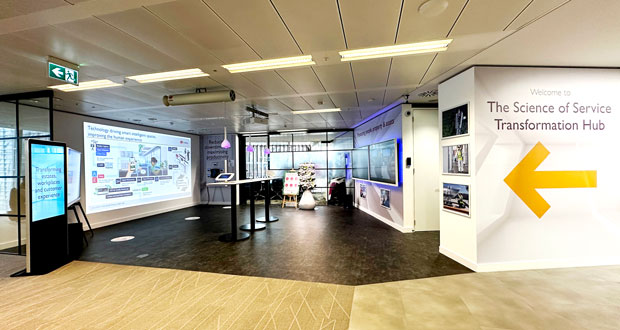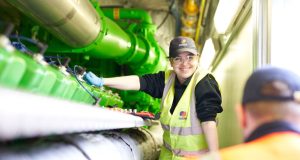 Catherine Wheatley, Head of Energy Services, Mitie says AI will play a major role in supporting the FM sector’s green agenda this year
Catherine Wheatley, Head of Energy Services, Mitie says AI will play a major role in supporting the FM sector’s green agenda this year
As King Charles put it when addressing world leaders at COP28, now is the time for ‘transformational action’ on climate change. Many organisations have reached a crucial stage in their decarbonisation journeys as their net zero targets draw nearer. Consequently, across the facilities management (FM) sector, we’re seeing increasing demand from customers to accelerate their path towards net zero.
While ‘transformational action’ has already started to materialise in our industry, smarter, more detailed data analysis and accelerating the application of artificial intelligence (AI) within decarbonisation projects will be major themes over the coming year. We’ve only just scratched the surface when it comes to experiencing the full impact of AI in the FM sector and so we anticipate that this will be a common thread across 2024.
ENERGY REDUCTION STRATEGIES
Between rising costs and businesses’ green agendas, customers are focused on reducing energy consumption, creating a growing need for detailed data and insights that are available at peoples’ fingertips. After all, the first step to reducing energy consumption is to measure it.
With building use becoming more complex post-pandemic, organisations need more detailed and more dynamic data. To help tackle this, we’re using a software tool that reviews data from across an organisation’s estate, identifying carbon hotspots in near-real time, giving us an understanding of where to focus energy efficiency efforts, without needing to grapple with multiple spreadsheets or manual processes.
Through an online portal, customers can rank different sites in their estate by energy consumption, benchmark by location or size, compare energy use over time and identify outliers. This insight guides organisations on what to prioritise when it comes to driving down their carbon emissions. This could mean switching to cleaner, greener energy at particular sites, or closing energy intensive equipment in certain areas of the office on quieter days.
CARBON REPORTING
Not only do organisations need a better understanding of their energy consumption, but investors are increasingly expecting more accuracy and transparency in carbon reporting. Many organisations are striving to achieve the Science Based Target initiative (SBTi) standards – a globally recognised validation of commitment to decarbonisation. The SBTi requires organisations to have carbon reduction targets in place that are in line with climate science, and also to report on Scope 3 emissions throughout their entire supply chain. At Mitie, we’re aiming to reach net zero across our Scope 3 emissions by 2035 and have developed targets, validated by the SBTi, in order to reach this goal.
As reporting requirements evolve, Scope 3 emissions are set to become more complicated to calculate, with SMEs likely to lack the resource to produce this data. This means the role FMs play in supporting customers with accurate carbon reporting across their supply chain will become even more important. Digital solutions identify the biggest carbon contributors throughout a customer’s supply chain, extrapolating the data from these ‘top players’ to get a picture of the carbon footprint across their entire supplier footprint. This insight provides customers with guidance on where to take action for the biggest impact when it comes to reviewing suppliers.
AI WILL ALLOW MICRO-GRIDS TO TAKE OFF
Many organisations are making the shift to produce their own power and reduce their reliance on variable energy prices. In fact, according to Innovation News Network, over a third (36 per cent) of businesses invested in on-site generation in 2023, with solar panels being the most popular option.
This also means that more organisations are requiring micro-grids. Micro-grids allow organisations to deliver surplus power back to the grid, but still give the option to receive power from a central source when they need it – essentially working in the same way, but on a smaller scale, to the National Grid. While the shift to energy independence relies on micro-grids, they are yet to be rolled out at significant scale.
Green infrastructure, like solar panels and batteries, are widely available to allow for energy to be generated and stored on-site, but smart analytics and AI are the pieces that will finish the puzzle for smart micro-grids to work successfully. AI assesses data about energy generation to ensure that supply and demand are balanced successfully. By getting this right, we can give organisations confidence that they can access the clean, green power when they need it, as well as increasing the business case for investment in on-site energy generation, thanks to the financial benefit of contributing power to the grid. Scaling up this application of AI will be a priority in 2024 to help the UK’s green energy ambitions advance.
AI was a buzzword throughout 2023 with every industry embracing the new opportunities it offers. The FM industry is no different. Going further with carbon data and embracing AI allow us to accelerate customers across the public and private sectors towards their net zero ambitions, and in turn support the UK’s net zero goals. I look forward to seeing the progress that will be made over the coming year as we continue to develop and adopt AI to drive forward the urgent climate action that is necessary.





